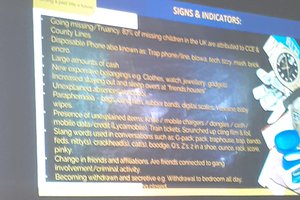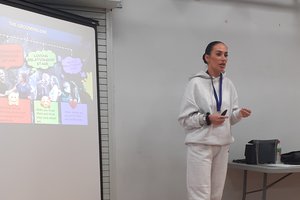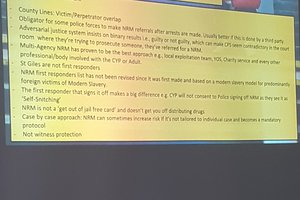On the Phoenix Programme, we recently attended a training on child criminal exploitation. The Phoenix Programme is being designed as part of the local partnership response to prevent and reduce serious violence. The VRN invited St Giles to provide training on Child Criminal Exploitation.
The training was insightful as it provided information about the operational requirements involved when setting up a house for the purpose of selling drugs. The research, marketing, and networking involved bore similarities to activities required when setting up a legitimate business. The trainer from St Giles confirmed that some “bandos” (houses used for the purposes of selling drugs), are dirty whilst others can be spotlessly clean.
A testimonial provided by gentle man who had gotten involved in crime historically because he wanted access to money. His hunger back then was similar to the hunger present in some young people today. At that time, he felt that he had chosen a lifestyle of crime, but in retrospect, he could see that his hunger was identified by those who were older than him, and he was chosen, in other words, he was groomed and exploited. Eventually, that hunger and the training he received led him to take bigger risks and get more entrenched in a life of crime. He also started to recruit others and groom them; from a perverted moral standpoint, he felt he was helping those he groomed, a saviour, a Robin Hood of sorts, sent to deliver them from a life of poverty and deprivation.
He affirmed that he went through the same process that described by the St. Giles trainer described. When setting up a bando, a drug house, he located someone who connected with a vulnerable female and did what he needed to do to get into her house. Once he was in her house, they took over and set it up as a drug house. He wrapped his drugs in a certain way, attached his number, to make it easy for people to contact him. In other words, he branded his product to make to it easy for people to identify his product. As he claimed new territories, he made more money and of course more enemies, which made it necessary for him to carry weapons. Eventually, he was caught in crossfire and was convicted for attempted for murder. He received a sentence of 30 years for instance and served 26 years.
It was interesting to note that in spite of his incarceration, he still felt the pull towards crime. He looked at some of his friends who had seemingly good lives and others who did not. His mission to help other young people is what keeps him from falling back into a life of crime. There is something to be said for the Power of Addiction…
The trainer made mention of a National Referral Mechanism (NRM). This is a form which should be filled in by a professional working with a young person, if they believe that they are being trafficked or exploited. If a child is under the age of 18 years old, and a first responder such as the police, social worker, some charities is working with the child, the form should be completed. Once the form is complete, it should be sent to a single competent authority, this is a team in the Home Office. A case worker from the Single competent authority assesses the NRM and makes a decision on whether there is sufficient evidence to indicate that the child is being exploited or trafficked. This is called a positive reasonable grounds decision. If it is found that there is insufficient grounds to support a case for trafficking, it is called a Negative reasonable grounds decision.
If a positive reasonable grounds decision is made, the case worker at the Single competent authority will gather information from others like police, social workers, youth offending services to get a better understanding of the case which supports trafficking. See below for more information about the NRM.
https://proceduresonline.com/trixcms2/media/11732/nrm-guide-for-yps.pdf
The trainer advised that is important to connect with a solicitor who utilises an NRM as this could help the final outcome for the participant.
It was interesting to note that the gentleman who provided his testimonial confirmed that everyone has a story and we are always dealing with a victim.
If you are a business and you would like to get involved in the work that we do by providing valuable work experience/work trials, please get in touch using the email address below.
Youth Justice Project Development Manager
Chikodi Oraka
chikodi@leicestershirecares.co.uk
To read about our Power to Change approach, click on the link below:
For more information and insight into the VIP Project click the links below:
https://www.leicestershirecares.co.uk/get-help/individuals/ex-offenders1/vip-project/
https://www.leicestershirecares.co.uk/about-charity/case-studies/jg-work-experience-case-study/


